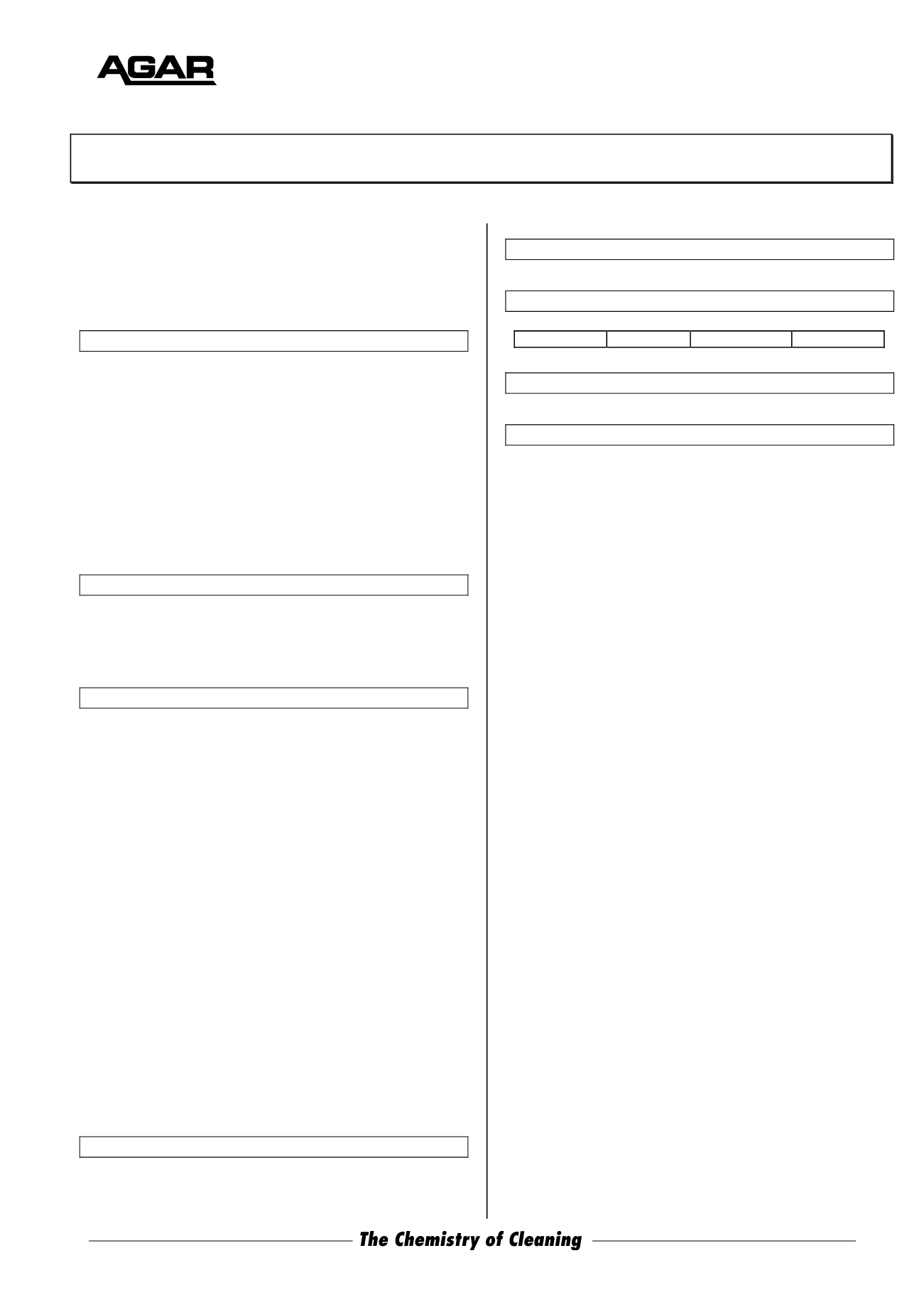

ABN 80 004 726 890
MADE IN AUSTRALIA
Safety Data Sheet
Issued: June 04, 2013
Page 2 of 2
MOP OIL
Personal Protection:
Gloves - Wear neoprene or nitrile gloves.
Note: Resistance of glove materials can vary. Evaluate
resistance under conditions of use and maintain PPE
carefully.
Eye-protection - Not normally required.
9 PHYSICAL AND CHEMICAL PROPERTIES
Appearance: Clear colourless liquid
Odour: Kerosene-type odour
pH = Not applicable
Vapour Pressure: Approx 0.7 kPa (20ºC)
Vapour Density: 4.5 (air = 1) (15ºC)
Boiling Point: 159 - 234
°
C
Freezing Point: < 0
°
C
Flash Point: 54 deg C (COC)
Flammability Limits : N/K
Solubility in water: Insoluble
Specific Gravity: 0.80 (20ºC)
Evaporation rate = c.0.16 (n-butyl acetate = 100)
% Volatile by vol: > 50%
10 STABILITY AND REACTIVITY
Flammability: Mop Oil is flammable. Avoid all ignition
sources. May form explosive mixtures with air.
Hazardous polymerization: Will not occur.
11 TOXICOLOGICAL INFORMATION
Health Effects:
Acute
–
Swallowed: Ingestion may cause solvent aspiration into the
lungs which may cause mild to severe pulmonary injury and
possibly death.
Eye: Eye contact may cause irritation.
Skin: Principal route of exposure is usually by skin contact.
Moderate irritant to the skin on prolonged contact.
Inhaled: Harmful. Inhalation may cause moderate irritation to
the respiratory tract and mucous membranes. Inhalation of
high vapour concentrations may cause headaches and
dizziness, are anaesthetic and may cause central nervous
system depression.
Health Effects -
Chronic
:
Repeated or prolonged skin contact may cause swelling,
redness, blistering or dermatitis. Chronic exposure to the
concentrated vapour may result in headache and symptoms
of central nervous system depression.
Toxicity Data: Not available for mixture.
Data for Kerosene: practically non-toxic
(oral LD50 and Dermal LD50 > 2000mg/kg).
(Note: this data is from published information. Agar Cleaning
Systems does not carry out animal tests).
12 ECOLOGICAL INFORMATION
Ecotoxicity: No data available.
Persistence and degradability: -
Mobility: -
Advice: Prevent release to the environment.
13 DISPOSAL CONSIDERATIONS
For disposal, refer to State Land Waste Management authority.
14 TRANSPORT INFORMATION
UN No.: 1993
Class: 3
Pack. Group: III Hazchem: 3[Y]
15 REGULATORY INFORMATION
Poisons Schedule Number: Schedule 5.
16 OTHER INFORMATION
AICS Listing:
All components of Mop Oil are listed on the
Australian Inventory of Chemical Substances (AICS).
Date: This SDS issued on June 04, 2013 shall remain valid for
5 years unless a new SDS is issued in the meantime. Please
contact Agar Cleaning Systems PL to ensure you have the
latest version of this product’s SDS.
Abbreviations and Definitions of terms used:
<
less than
>
greater than
AICS
Australian Inventory of Chemical Substances
CAS
Chemical Abstracts Service (Registry Number)
COD
Chemical Oxygen Demand
deg C
Degrees Celsius
g
gram
g/L
grams per litre
HSIS
Hazardous Substance Information System
kg
kilogram
L
Litre
LC50
The concentration of a material (inhaled) that will be
lethal to 50% of the test animals.
LD50
The dose (swallowed all at once) which is lethal to
50% of a group of test animals.
m3
Cubic metre or cu.m.
mg
milligram
mg/m3
milligrams per cubic metre
miscible
A liquid that mixes homogeneously with another liquid
N/A
Not applicable
N/K
Not known
NIOSH
National Institute for Occupational Safety and Health
non-haz
Non- hazardous
PEL
Permissible Exposure Limit
ppb
Parts per billion
PPE
Personal Protective Equipment
ppm
Parts per million
‘Skin’
Ingredient may be absorbed through the skin
STEL
Short term exposure limit: the average airborne
concentration over a 15 minute
period which should not be exceeded at
any time during a normal eight hour
workday.
TLV
Threshold Limit Value
TWA
Time Weighted average: the average airborne
concentration of a particular substance when
calculated over a normal eight hour working day, for a
five day week.
UN
United Nations (Number)
wt
Weight
The information in this Data Sheet is based on our present knowledge.
However, this shall not constitute a guarantee for any specific product
features and shall not establish a legally valid contractual relationship. Agar
Cleaning Systems accepts no tortious or contractual liability for any loss or
damages suffered as a consequence of reliance on the information and
advice contained herein.
End of SDS.


















